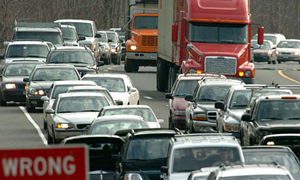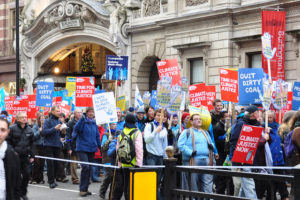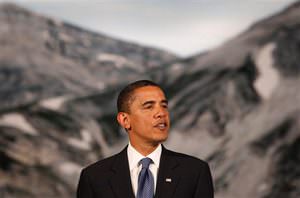Fouling the Clean Air Act
In a largely hidden component of its attack on the federal budget, the House of Representatives has approved a key Republican campaign promise to big business: protecting it from what the new majority calls the handcuffs of environmental safeguards. If the Republicans prevail in the Senate and overcome a White House veto, they would hobble the Clean Air Act.
By Dan Becker and James Gerstenzang
In a largely hidden component of its attack on the federal budget, the House of Representatives has approved a key Republican campaign promise to big business: protecting it from what the new majority calls the handcuffs of environmental safeguards. The Republicans would cuff the Environmental Protection Agency instead.
If the Republicans prevail in the Senate and overcome a White House veto, they would hobble the Clean Air Act, probably the most successful U.S. law protecting health and the environment, and threaten the authority of California and several other states to use it to fight pollution and global warming.
The Clean Air Act has meant fewer hospitalizations and missed workdays, and would save a projected $2 trillion in 2020 alone by reducing asthma, chronic bronchitis and premature deaths from lung disease. Now, having been given the go-ahead by the Supreme Court, the EPA is using it to cut back on carbon dioxide pollution, the prime culprit behind our changing climate.
Think of the law as the legal weapon—passed by an overwhelming bipartisan congressional majority, signed by President Richard M. Nixon, approved by the highest court—that has allowed every president beginning with Nixon to fight some of the nation’s most difficult health and environmental challenges. Using the law to reduce carbon dioxide will bring us solutions that people like: hybrid and other high-tech, gas-sipping cars that cut our gasoline bills by more than the costs of the improved technology.
But some of the nation’s biggest polluters have teamed up with the Republicans to try to stop progress—as the evidence of global warming grows: The 10 warmest years on record have all been since 1998; last year was tied with 2005 as the hottest. Together, the polluters and the GOP would turn the House into a special-interest court of appeals to circumvent the 2007 Supreme Court ruling that ordered the EPA to fight global warming. They would limit the clean air law’s protections against power plant pollution and block several states from adopting tougher pollution controls than the federal government.
California has been a leader in setting air pollution and emissions standards under Clean Air Act provisions. Its efforts to set strong standards have been joined by 13 other states, among them New York, Connecticut, Pennsylvania and Washington.
Now, automakers are demanding that politicians—not scientists—write the clean car standards intended to reduce carbon dioxide pollution.
The automakers supported a 5 percent annual reduction in emissions that will get us to 35.5 miles per gallon in 2016—the biggest step we’ve taken against global warming. They say they cannot cut emissions 6 percent the next year. These are the same people who said they could not equip cars with seat belts, air bags or catalytic converters.
By using continuously variable transmissions, low-friction lubricants, improved engines, aerodynamic designs and high-strength lightweight steel and producing electric vehicles, the manufacturers could deliver a fleet that would achieve 62 mpg, cut our emissions by 6 percent per year and help us reduce our oil consumption by half by 2030, saving us money at the pump.
Sure, they don’t want to. But they can. If you don’t believe this, listen to Toyota.
Whatever goal the administration sets “Toyota will be prepared to meet,” the automaker’s vice president for product communications, Jim Colon, said. “If it’s 62 miles a gallon, we’ll be able to achieve that.”
Even General Motors, famously late to the innovation starting line, says it will join the race—if ordered. Mark Reuss, the company’s top North American executive, said that although he was concerned about meeting a 62-mpg standard, “I think the industry can do anything it wants when it puts its mind to it … we’re going to make a plan that’s profitable with cars and trucks that people want.”
That would be a welcome epiphany for a company that stayed afloat only with the help of a $50 billion bailout from America’s taxpayers.
With the planet growing warmer, gasoline prices climbing and new turmoil in the Middle East threatening our energy security, we can’t afford to allow polluters to team up with the new House leadership to deny us progress.
As Mark Twain said, “Denial ain’t just a river in Egypt.”
Dan Becker is director of the Safe Climate Campaign, which advocates strong action to fight global warming. James Gerstenzang is the campaign’s editorial director.
Your support is crucial…With an uncertain future and a new administration casting doubt on press freedoms, the danger is clear: The truth is at risk.
Now is the time to give. Your tax-deductible support allows us to dig deeper, delivering fearless investigative reporting and analysis that exposes what’s really happening — without compromise.
Stand with our courageous journalists. Donate today to protect a free press, uphold democracy and unearth untold stories.







You need to be a supporter to comment.
There are currently no responses to this article.
Be the first to respond.